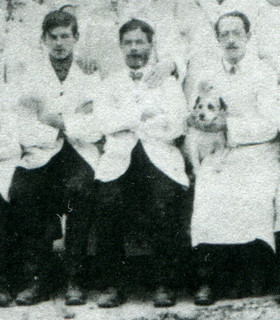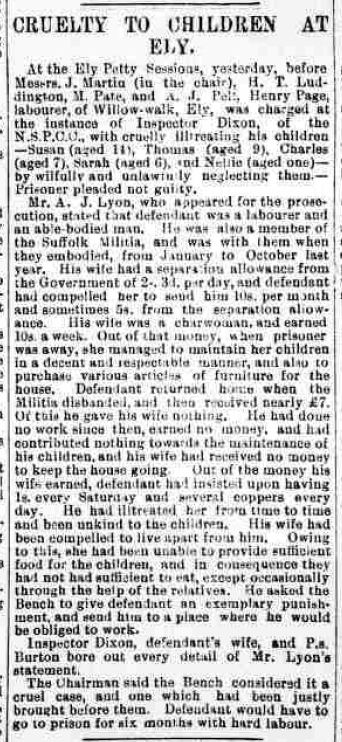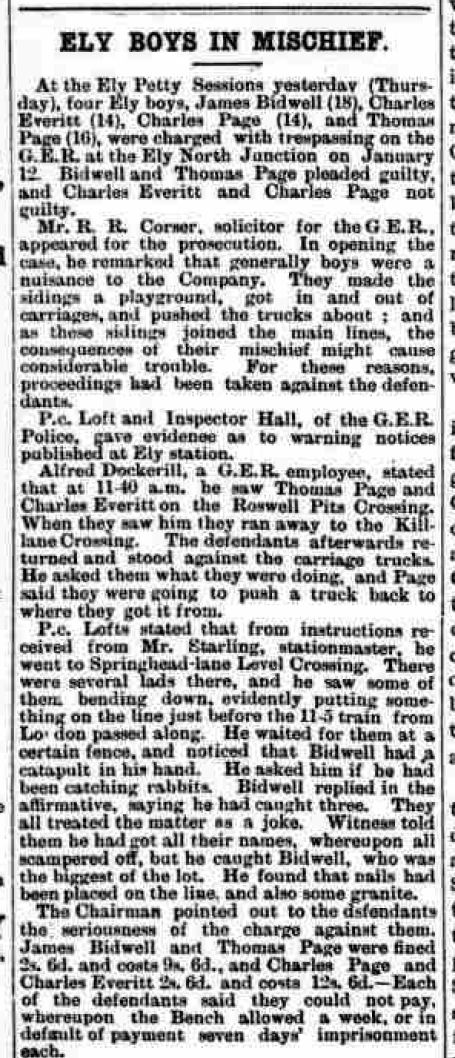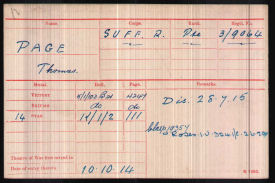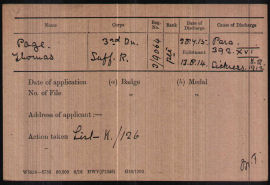MY GRANDPARENTS - I - MY GREAT-GRANDPARENTS - I - MY GREAT-GREAT-GRANDPARENTS - I - MY GREAT-GREAT-GREAT-GRANDPARENTS
KNOTT - I - BOWLES - I - WATERS - I - HARRALL - I - PAGE - I - WISEMAN - I - CROSS - I - CARTER
CORNWELL - I - HUCKLE - I - MORTLOCK - I - MANSFIELD - I - REYNOLDS - I - CARTER - I - ANABLE - I - STEARN
CHRONOLOGY - I - DRAMATIS PERSONAE - I - WHERE PEOPLE CAME FROM - I - CALENDAR
MAP OF ELY - I - MAP OF MEDWAY
MAP OF
CAMBRIDGE AND DISTRICT
WORLD WAR I - I - WORLD WAR II
simonknott.co.uk I home I e-mail
Thomas Page
born Ely,
Cambridgeshire 1890
died Ely, Cambridgeshire 1964
on the Page family tree
part of the Page
and Wiseman family stories
brother of Arthur Page, Henry Page, Herbert Page and Robert Page
son of
Henry Page
and Alice Wiseman
Thomas Page
(1890-1964). My Father's Mother's Father's
Brother. My Great-Great-Uncle.
Thomas Page was the younger brother of my
great-grandfather Arthur Page. The Pages were a large
family, and lived in the Back Hill area of Ely. Thomas
served in World War One, and afterwards worked at the Jam
Factory in Ely. He sits on the left of the photograph
above, looking very much like my father at the same age.
1890: Thomas born on 2nd June in Broad Street, Ely. He was baptised in Holy Trinity parish, probably at St Peter's church, along with his brother Charles and sister Sarah on 5th October 1895.
|
1901: On 29th March, the Cambridge Independent Press reported that Thomas's father Henry Page, a labourer of of Willow Walk in Ely, was charged at Ely Petty Sessions at the instance of Inspector Dixon of the NSPCC with cruelly ill-treating his children - Susan (aged 11), Thomas (aged 9), Charles (aged 7), Sarah (aged 6) and Nellie (aged 1) by wilfully and unlawfully neglecting them. Henry pleaded not guilty. The charge was brought because he had failed to provide money for the family despite his £7 payoff for six months with the Suffolk Militia. Alice had been able to look after the family while he had been away, but on his return she had been forced to live apart from him because he ill-treated her from time to time and was unkind to the children. He demanded from her the money she earned as a charwoman, leaving her with only a few coppers, and she was unable to provide enough food for the children. Henry was given an exemplary sentence of six months with hard labour.
1901 census: Thomas was ten years old at the time of the 1901 census. The Page family were living in Broad Street, Ely, Cambridgeshire. Alice, his mother, was 44 years old. She is shown as a charwoman. Thomas's father Henry was in prison at the time of the 1901 census. There were seven children at home at the time of the 1901 census. John, an agricultural labourer, was 20, Herbert, an errand boy, was 18, Susan was 14, Thomas was 10, Charles was 8, Sarah 6 and Helen 1. Thomas was born in Ely,
Cambridgeshire, as were all the rest of
the household. The transcript for their entry is here. |
1911 Census: Thomas was twenty-one at the time of the 1911 census. He was a Private soldier in the 3rd Battalion of the Suffolk Regiment, the Suffolk Militia, based at Bury St Edmunds, presumably called up as part of the reserve. 1912: Thomas is shown on a photograph taken at Ely Jam Factory this year, along with his brother Henry (see top of the page). 1914: Thomas was 24 when the Great War broke out. He was recalled to the 3rd Battalion, Suffolk Regiment on the 13th August 1914, nine days after war was declared. His medal record shows that he entered the theatre of war on the 10th October. The Suffolk Militia were based at Felixstowe, and seem to have served mainly as a battalion of men transferred to supplement the losses of other battalions of the Suffolk Regiment. If Thomas entered the theatre of war on the 10th October, then he was probably one of the recruits sent to France to bolster the 2nd Suffolks after their losses at Le Cateau. These men spent most of the rest of 1914 waiting outside of Ypres, and they were among the troops inspected by George V, an event described by Henry Williamson in his Chronicle of Ancient Sunlight sequence. Also described in vivid detail by Williamson was the Christmas Truce of 1914, which he witnessed and which Thomas Page and the 2nd Suffolks would also have taken part in. 1915: The early part of 1915 was relatively uneventful for the 2nd Suffolks, mostly engaged in waiting and trench digging near to the Menin Road. Thomas's medal records show that he was discharged on the 25th July 1915, the cause given as sickness under paragraph 392 King's Regs XVI, which consisted of No longer physically fit for service - whatever it was, it was sufficient for Thomas not to be recalled at the start of general conscription in 1916, and he appears to have spent the rest of the War in Ely. I have been told that this was the standard way for soldiers with syphilis to be discharged, although the fact that Thomas lived for a further half century suggests that this was not the case with his discharge. It is notable that Thomas was awarded the roses clasp in 1935. Recipients had to apply for this, which was awarded to those who had served under fire or who had operated within range of enemy mobile artillery in France or Belgium during the period between 5 August and 22 November 1914. 1916: On Boxing Day, Thomas married Emily Ann Agnes Price in the Lady Chapel of Ely Cathedral. He was 26, she was 24. These are fairly elderly ages for a couple to be married in Trinity Parish, especially as Thomas and Emily had clearly known each other for a while. A notice appeared in the Cambridge Independent Press of 29th December. The witnesses were his sister Sarah Flack and his brother Henry. 1920: Thomas appears with his brother Henry in another photograph of the Ely Jam Factory workforce, taken after the War. His wife Emily is also in this photograph. 1964: Thomas died in the Ely registration district in the third quarter of the year. |
